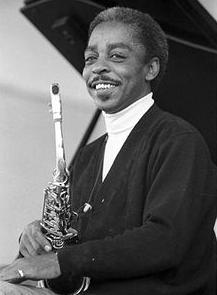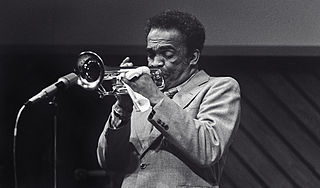
Theodore "Fats" Navarro (September 24, 1923 – July 6, 1950 was an American jazz trumpet player. He was a pioneer of the bebop style of jazz improvisation in the 1940s. He had a strong stylistic influence on many other players, including Clifford Brown.

William "Sonny" Criss was an American jazz musician.

Howard McGhee was one of the first bebop jazz trumpeters, with Dizzy Gillespie, Fats Navarro and Idrees Sulieman. He was known for his fast fingers and very high notes. What is generally not known is the influence that he had on younger hard bop trumpeters, with Fats Navarro.
West Coast jazz refers to styles of jazz that developed in Los Angeles and San Francisco during the 1950s. West Coast jazz is often seen as a subgenre of cool jazz, which consisted of a calmer style than bebop or hard bop. The music relied relatively more on composition and arrangement than on the individually improvised playing of other jazz styles. Although this style dominated, it wasn't the only form of jazz heard on the American West Coast.
This is a list of Charlie Parker's recordings. Parker recorded extensively for three labels: Savoy, Dial, and Verve. His work with these labels has been chronicled in box sets. Charlie Parker's Savoy and Dial Sessions have been issued on The Complete Savoy Sessions, Charlie Parker on Dial and Complete Charlie Parker on Dial and The Complete Savoy & Dial Master Takes. His Verve recordings are available on Bird: The Complete Charlie Parker on Verve and The Complete Verve Master Takes.
Carl Perkins was an American jazz pianist.
"Yardbird Suite" is a bebop standard composed by jazz saxophonist Charlie Parker in 1946. The title derives from Parker's nickname "Bird", respectively "Yardbird". Far from being a suite, the song follows an AABA form. The "graceful, hip melody, became something of an anthem for beboppers."
Cool Bird is a compilation album released by Magnum Collectors of recording sessions undertaken during October-December 1947 by Charlie Parker's 'classic quintet' for the Dial label featuring Parker, Miles Davis, Duke Jordan, Tommy Potter and Max Roach. They are joined by J. J. Johnson on six of the 22 tracks.
"Ko Ko" is a 1945 bebop recording composed by Charlie Parker. The original recorded version features Parker on alto saxophone with trumpeter Miles Davis, double bassist Curley Russell and drummer Max Roach. Due to the absence of Bud Powell, Dizzy Gillespie was enlisted to play piano, instead of his usual trumpet. Pianist Sadik Hakim, then known as Argonne Thornton, was also known to be present at the session. Rumors persist to this day about precisely who played trumpet and piano on this piece; some claim it's young Miles Davis who plays trumpet and Gillespie comping at piano, on both takes, proving it with accurate analysis of the recording; some claim Gillespie plays trumpet and, or instead of, piano; some claim Hakim is the pianist on all or part of one or both of the takes.

Arvin Charles Garrison was an American jazz guitarist. He was born in Toledo, Ohio, and spent most of his life there.

Complete Charlie Parker on Dial is a 1996 box set release of jazz saxophonist and composer Charlie Parker's 1946-1947 recordings for Dial Records. The box set, released by Jazz Classics, features 89 songs, including alternate takes and notes composed by jazz historian and Parker biographer Ira Gitler. John Genarri, author of the book Blowin' Hot and Cool: Jazz and Its Critics singles out the recording of "Lover Man" on this album, noting that "[t]his wrenching, anguished version...has been called Parker's most poetic statement on record" though, says Gennari, Parker himself viewed it as substandard and threatened physical violence against Ross Russell, a Dial records producer, for including it. Gennari also indicates that other tracks included on this CD—"Relaxin' at Camarillo", "Cheers", "Stupendous" and "Carvin' the Bird"—"have struck many listeners as his most joyous and optimistic."

Charlie Parker on Dial: The Complete Sessions is a 1993 four-disc box set collecting jazz saxophonist and composer Charlie Parker's 1940s recordings for Dial Records. The box set, released by the English label Spotlite Records, assembled into a single package the multi-volume compilation albums the label had released by Spotlite on vinyl in the 1970s under the series title Charlie Parker on Dial. The box set has been critically well received. In 1996, a different box set collecting Parker's work with Dial was assembled by Jazz Classics and released as Complete Charlie Parker on Dial.
George Morrow was a jazz bassist.
This article lists Charlie Parker's Savoy and Dial sessions as leader, which were recorded between 1945 and 1948.










